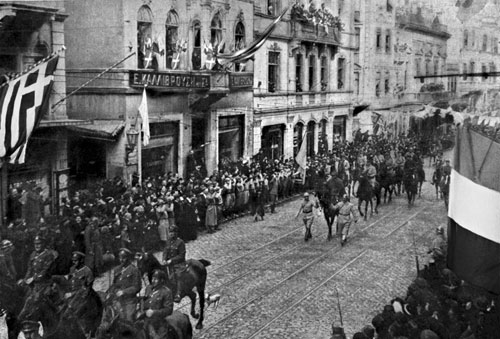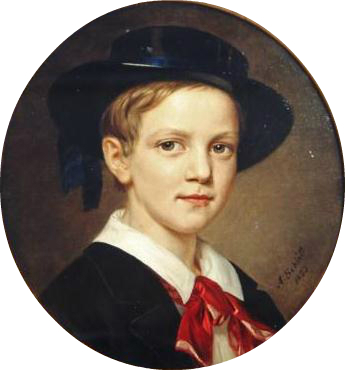|
Konstantinos Miliotis-Komninos
Konstantinos Miliotis-Komninos ( el, Κωνσταντίνος Μηλιώτης-Κομνηνός, 1854–1941) was a Hellenic Army officer who rose to the rank of Lieutenant General. He was also an amateur swordsman, competing in the 1896 Athens Olympics. He also served in the Organizing Committee for the 1906 Intercalated Games. Biography Konstantinos Miliotis-Komninos was born in Ermoupolis in the island of Syros in 1854, and enlisted in the Greek Army, Hellenic Army on 11 April 1877 as a volunteer, serving in the cavalry. He fought in the Greco-Turkish War of 1897. In 1905, as a major, he was aide de camp to King George I of Greece, and was appointed an honorary Commander of the Royal Victorian Order. During the Balkan Wars, he held the rank of Colonel and commanded the 6th Infantry Division (Greece), 6th Infantry Division. During the First World War, he supported the Venizelist Movement of National Defence, and became Minister of War in the provisional government on 6 Decembe ... [...More Info...] [...Related Items...] OR: [Wikipedia] [Google] [Baidu] |
Ermoupolis
Ermoupoli ( el, Ερμούπολη), also known by the formal older name Ermoupolis or Hermoupolis ( el, < "Town of "), is a town and former on the island of , in the , . Since the 2011 local government reform, it is part of the municipality Syros-Ermoupoli, of whi ... [...More Info...] [...Related Items...] OR: [Wikipedia] [Google] [Baidu] |
1906 Intercalated Games
The 1906 Intercalated Games or 1906 Olympic Games was an international multi-sport event that was celebrated in Athens, Greece. They were at the time considered to be Olympic Games and were referred to as the "Second International Olympic Games in Athens" by the International Olympic Committee.Journal of Olympic History, Volume 10, December 2001/January 2002, ''The 2nd International Olympic Games in Athens 1906'', by Karl Lennartz However, the medals that were distributed to the participants during these games are not officially recognised by the and are not displaye ... [...More Info...] [...Related Items...] OR: [Wikipedia] [Google] [Baidu] |
Greek Legislative Election, 1920
Parliamentary elections were held in Greece on Sunday, 14 November 1920,John S. Koliopoulos and Thanos M. Veremis (2010''Modern Greece: A History since 1821''Wiley-Blackwell, p87 or 1 November 1920 old style. They were possibly the most crucial elections in the modern history of Greece, influencing not only the few years afterwards, including the Greek defeat by Kemal Atatürk's reformed Turkish Land Forces in 1922, but setting the stage for Greece's political landscape for most of the rest of the 20th century. It had been nearly five years since the last elections, a period during which all democratic procedures were suspended due to the National Schism, when Prime Minister Eleftherios Venizelos announced that elections would take place on 25 October. However, after the unexpected death of King Alexander, who had assumed the throne after the exile of his father, King Constantine I, the elections were postponed until 14 November. Venizelos believed a victory for his Liberal Par ... [...More Info...] [...Related Items...] OR: [Wikipedia] [Google] [Baidu] |
Leonidas Paraskevopoulos
Leonidas Paraskevopoulos ( el, Λεωνίδας Παρασκευόπουλος; 7 October 1860 – 16 May 1936) was a senior officer of the Hellenic Army and politician. He played a major role in Greece's war effort during World War I, and was the commander-in-chief of the Army of Asia Minor in 1919–20. In later life he was a member of the Greek Senate and served as its speaker in 1930–32. Life Leonidas Paraskevopoulos was born on 7 October 1860 on the island of Kythnos. His family hailed from Smyrna, Asia Minor. He entered the Hellenic Military Academy and graduated in November 1881 as an Artillery 2nd Lieutenant. During the Greco-Turkish War of 1897, he served in the expeditionary corps sent to Crete under Colonel Timoleon Vassos. During the First Balkan War of 1912–13, he initially served as the commander of the 2nd Field Artillery Regiment, but already at the Battle of Sarantaporo he was appointed with the supervision of the entire artillery establishment of the Ar ... [...More Info...] [...Related Items...] OR: [Wikipedia] [Google] [Baidu] |
Treaty Of Sèvres
The Treaty of Sèvres (french: Traité de Sèvres) was a 1920 treaty signed between the Allies of World War I and the Ottoman Empire. The treaty ceded large parts of Ottoman territory to France, the United Kingdom, Greece and Italy, as well as creating large occupation zones within the Ottoman Empire. It was one of a series of treaties that the Central Powers signed with the Allied Powers after their defeat in World War I. Hostilities had already ended with the Armistice of Mudros. The treaty was signed on 10 August 1920 in an exhibition room at the Manufacture nationale de Sèvres porcelain factory in Sèvres, France. The Treaty of Sèvres marked the beginning of the partitioning of the Ottoman Empire. The treaty's stipulations included the renunciation of most territory not inhabited by Turkish people and their cession to the Allied administration. The ceding of Eastern Mediterranean lands saw the introduction of novel polities, including the British Mandate for Palestin ... [...More Info...] [...Related Items...] OR: [Wikipedia] [Google] [Baidu] |
Smyrna Zone
The city of Smyrna (modern-day İzmir) and surrounding areas were under Greek military occupation from 15 May 1919 until 9 September 1922. The Allied Powers authorized the occupation and creation of the Zone of Smyrna ( el, Ζώνη Σμύρνης, Zóni Smýrnis) during negotiations regarding the partition of the Ottoman Empire to protect the ethnic Greek population living in and around the city. The Greek landing on 15 May 1919 was celebrated by the substantial local Greek population but quickly resulted in ethnic violence in the area. This violence decreased international support for the occupation and led to a rise in Turkish nationalism. The high commissioner of Smyrna, Aristeidis Stergiadis, firmly opposed discrimination against the Turkish population by the administration; however, ethnic tensions and discrimination remained. Stergiadis also began work on projects involving resettlement of Greek refugees, the foundations for a university, and some public health projects. ... [...More Info...] [...Related Items...] OR: [Wikipedia] [Google] [Baidu] |
Thessaloniki Front
The Macedonian front, also known as the Salonica front (after Thessaloniki), was a military theatre of World War I formed as a result of an attempt by the Allied Powers to aid Serbia, in the autumn of 1915, against the combined attack of Germany, Austria-Hungary and Bulgaria. The expedition came too late and in insufficient force to prevent the fall of Serbia, and was complicated by the internal political crisis in Greece (the "National Schism"). Eventually, a stable front was established, running from the Albanian Adriatic coast to the Struma River, pitting a multinational Allied force against the Bulgarian Army, which was at various times bolstered with smaller units from the other Central Powers. The Macedonian front remained quite stable, despite local actions, until the great Allied offensive in September 1918, which resulted in the capitulation of Bulgaria and the liberation of Serbia. Background Following the assassination of the Crown Prince by a Bosnian Serb, Austr ... [...More Info...] [...Related Items...] OR: [Wikipedia] [Google] [Baidu] |
Movement Of National Defence
The Provisional Government of National Defence (), also known as the State of Thessaloniki (Κράτος της Θεσσαλονίκης), was a parallel administration, set up in the city of Thessaloniki by former Prime Minister Eleftherios Venizelos and his supporters during World War I, in opposition and rivalry to the official royal government in Athens. The establishment of this second Greek state had its origins in the debate over Greece's entry into the war on behalf of the Entente, as advocated by Venizelos, or a Germanophile neutrality as preferred by King Constantine I. This dissension soon began to divide Greek society around the two leaders, beginning the so-called "National Schism". In August 1916, as parts of eastern Macedonia were not defended by the royal government against a Bulgarian invasion, Venizelist officers of the Hellenic Army launched an Entente-supported coup in Thessaloniki. After a brief hesitation, Venizelos and his principal supporters joined t ... [...More Info...] [...Related Items...] OR: [Wikipedia] [Google] [Baidu] |
Venizelist
Venizelism ( el, Βενιζελισμός) was one of the major political movements in Greece from the 1900s until the mid-1970s. Main ideas Named after Eleftherios Venizelos, the key characteristics of Venizelism were: *Greek irredentism: The support of the Megali Idea. *Greek nationalism (liberal nationalism) *Liberal democracy: Venizelists represented upcoming urban classes that were against the old conservative establishment, which also had close ties with the palace. *Pro-Western: Alliance with the Entente against the Central Powers during WWI, and with the Allies during WWII. Also pro-Western during the Cold War, but later diverged with direct confrontation between Greek nationalist forces in Cyprus against British colonial forces. *Republicanism: Despite Venizelos' moderation regarding the monarchy, most of his supporters were in favour of a Republic, on the French standards. * Mixed economic policies: from economic liberalism to social democracy policies. * Anti-Bols ... [...More Info...] [...Related Items...] OR: [Wikipedia] [Google] [Baidu] |
Commander Of The Royal Victorian Order
The Royal Victorian Order (french: Ordre royal de Victoria) is a dynastic order of knighthood established in 1896 by Queen Victoria. It recognises distinguished personal service to the British monarch, Monarchy of Canada, Canadian monarch, Monarchy of Australia, Australian monarch, or Monarchy of New Zealand, New Zealand monarch, members of the monarch's family, or to any viceroy or senior representative of the monarch. The present monarch, King Charles III, is the sovereign of the order, the order's motto is ''Victoria'', and its official day is 20 June. The order's chapel is the Savoy Chapel in London. There is no limit on the number of individuals honoured at any grade, and admission remains at the sole discretion of the monarch, with each of the order's five grades and one medal with three levels representing different levels of service. While all those honoured may use the prescribed styles of the order – the top two grades grant titles of knighthood, and all grades acco ... [...More Info...] [...Related Items...] OR: [Wikipedia] [Google] [Baidu] |
George I Of Greece
George I ( Greek: Γεώργιος Α΄, ''Geórgios I''; 24 December 1845 – 18 March 1913) was King of Greece from 30 March 1863 until his assassination in 1913. Originally a Danish prince, he was born in Copenhagen, and seemed destined for a career in the Royal Danish Navy. He was only 17 years old when he was elected king by the Greek National Assembly, which had deposed the unpopular Otto. His nomination was both suggested and supported by the Great Powers: the United Kingdom of Great Britain and Ireland, the Second French Empire and the Russian Empire. He married Grand Duchess Olga Constantinovna of Russia in 1867, and became the first monarch of a new Greek dynasty. Two of his sisters, Alexandra and Dagmar, married into the British and Russian royal families. Edward VII of the United Kingdom and Alexander III of Russia were his brothers-in-law, and George V of the United Kingdom, Christian X of Denmark, Haakon VII of Norway, and Nicholas II of Russia were his nephew ... [...More Info...] [...Related Items...] OR: [Wikipedia] [Google] [Baidu] |









